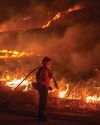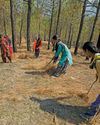
AFTER SHOWING some signs of progress, Africa is backsliding in its efforts to meet energy needs of its population. More Africans live without electricity and clean cooking fuel now than a decade ago (see 'Left behind'). In subSaharan Africa, which is home to some of the world's poorest countries, every other person (566 million) lacks access to electricity and 82 per cent (933.5 million) prepare meals with polluting fuel. This is at a time when most other regions are on track to achieve universal access to clean energy as part of the UN's Sustainable Development Goal 7. In North Africa and West Asia, 92.6 per cent of the people have access to clean fuel and technology, shows an estimate by the International Energy Agency (IEA) in its report, "Tracking SDG7: The Energy Progress Report, 2022"; globally, the figure is 71.1 per cent.
The IEA report further states that sub-Saharan Africa's share in the global population without electricity has risen to 84 per cent from 50 per cent a decade ago; and its share in global population without clean cooking fuel has increased to 41 per cent from 25 per cent. If governments respond ineptly, warns the UN, over 1.1 billion people in the region could be without clean fuels by 2030.
Such a high level of energy poverty has ripple effects on people's everyday lives; it impacts health, shrinks livelihood options, impedes economic growth and makes access to education nearly impossible. More than that, it creates a trap that keeps countries underdeveloped and people poor. This is already playing out in sub-Saharan Africa.
هذه القصة مأخوذة من طبعة July 01, 2023 من Down To Earth.
ابدأ النسخة التجريبية المجانية من Magzter GOLD لمدة 7 أيام للوصول إلى آلاف القصص المتميزة المنسقة وأكثر من 9,000 مجلة وصحيفة.
بالفعل مشترك ? تسجيل الدخول
هذه القصة مأخوذة من طبعة July 01, 2023 من Down To Earth.
ابدأ النسخة التجريبية المجانية من Magzter GOLD لمدة 7 أيام للوصول إلى آلاف القصص المتميزة المنسقة وأكثر من 9,000 مجلة وصحيفة.
بالفعل مشترك? تسجيل الدخول

THE CIRCULARITY ARGUMENT
A circular economy can help India achieve its developmental aspirations while following the low-carbon pathway. It will also help address the challenges of waste management, pollution and overexploitation of natural resources. Industries are already innovating to reuse high-volume wastes and have shown that the transition can usher in both environmental and financial windfalls

Banking on flawed drug voluntary licences
The Medicines Patent Pool is pushing for more VLs, but its bad deal with Novartis on a cancer drug shows the pitfalls

Lasting solutions
For the first time, the UN has recognised the role of indigenous communities in tackling aridity. A repository of traditional knowledge India has the wherewithal to lead the way

IMD at 150
India's journey into modern weather forecasting took a decisive turn 150 years ago with the establishment of India Meteorological Department during the British rule. The agency has come a long way since then, shaping the way the country predicts and responds to its diverse climate challenges

Every drop counts
In drought-prone Marathwada region, 14 villages have managed to counter water shortage by budgeting the resource

Threat to survival
Hollongapar Gibbon Sanctuary in Assam faces ecological challenges as railway electrification and hydrocarbon exploration endanger its fragile biodiversity

'Migration is going to be a battlefield'
AMITAV GHOSH is one of the foremost chroniclers of our times. His literary sojourn includes writings on topics that range from languages to climate change to human lives. His latest book, Wild Fictions, brings some of his works on these issues under one title. In a conversation with RAJAT GHAI, Ghosh shares his views on the future of human movement. Excerpts:

Face of future
California wildfires confirm forest fires are intensifying in a hotter world, emitting substantial amounts of greenhouse gases and reinforcing global warming

Friends of the forest
Residents of 30 villages in Uttarakhand establish a model for public participation in saving forests from wildfires

Climate-crazy playbook
Just hours after his second (and final) term began on January 20, US President Donald Trump unleashed 46 presidential actions. Several of these are centred on the US' climate commitments, energy transition, migration and trade policies, and are likely to have negative global implications